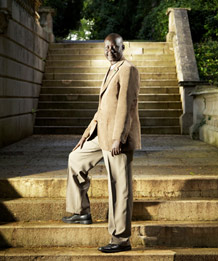
Deng-Gach Pal
South Sudan independence gains support from Exeter student
The independence of South Sudan on 9 July will be celebrated by many as it takes its first steps as a new country.
One of those celebrating will be a University of Exeter student who is helping to shape the future of the African state.
Following years of civil war and conflict over oil and resources, South Sudan has limited infrastructure and is in need of a government that will scrutinise the process of democracy and leadership. Deng-Gach Pal, a South Sudanese civil servant and mature student on the MA Public Administration at the University of Exeter is laying foundations for democracy and how public services are delivered.
Deng-Gach Pal has been working in the Ministry of Parliamentary Affairs, which is responsible for building and nurturing democratic governance. North Sudan is predominantly Muslim and originally housed the state government and main areas of commerce, whereas the Christian South, which is rich in oil and resources, did not have any functioning hospitals and had few roads and schools.
Deng came to the UK in 2010, sponsored by the Foreign and Commonwealth Office and Chevening Scholarship Programme. The MA in Public Administration (MPA) is studied by mature students from many countries in the developed and developing world. It is a comparative course that looks at the best practice around the world and examines the fundamental principles of good governance found in many different societies.
Andrew Massey Professor of Politics and programme leader of the MPA said: “Deng is an inspirational member of the MPA, he is knowledgeable and dedicated to serving his people.”
He added, “Our students learn about what things work in terms of service delivery, but just as importantly, how to avoid some of the obvious errors governments make.”
Deng was inspired to support the new independent South Sudan and its new education system by his own past. Originally from Sudan, Deng’s family sought refuge in Ethiopia when he was 10 due to his father’s anti-north government ideas. He moved several times, once to a military camp where he was promised an education, but was recruited as a child solider for the Sudan People’s Liberation Army (Red Army). He managed to leave and complete his primary and secondary education in other Ethiopian refugee camps following the downfall of the Regime in 1991, after which many Sudanese fled back to South Sudan. The struggle had not finished as Deng felt that he and others like him were regarded with contempt on their return to Sudan.
Deng said, “Sudan became to me a place where the vast majority of citizens had no legal rights while a minority enjoyed unlimited liberty. I hated being Sudanese, preferring living as a refugee in a foreign land to being a second-class citizen without rights and freedoms.”
He has since been involved in planning and implementing capacity-building training programmes on parliamentary principles and practices, and democratic governance for the ten Southern States Legislative assemblies and civil society organisations. He also became the coordinator of government civic voter education programmes ahead of the general elections in April 2010. This gave him the opportunity to teach the southern populace their citizenship duties, responsibilities, and rights of democratic participation.
In addition, he worked as assistant editor-in-chief of the government-run newsletter, The Parliamentarian, which educated parliamentarians and government officials on managing legislative affairs and promoted good governance.
Deng added: “Eventual separation from the north is, I believe, the best thing that South Sudanese people have ever attained, though lots of formidable challenges lie ahead. These include combating corruption, eradicating tribalism, building the economy, maintaining security and making effective policies in all sectors. South Sudan’s new government will need further policy advice and help with establishing its own higher education programmes if we are to achieve our goals.”
Deng-Gach Pal has written a blog about his experiences.
Date: 7 July 2011
